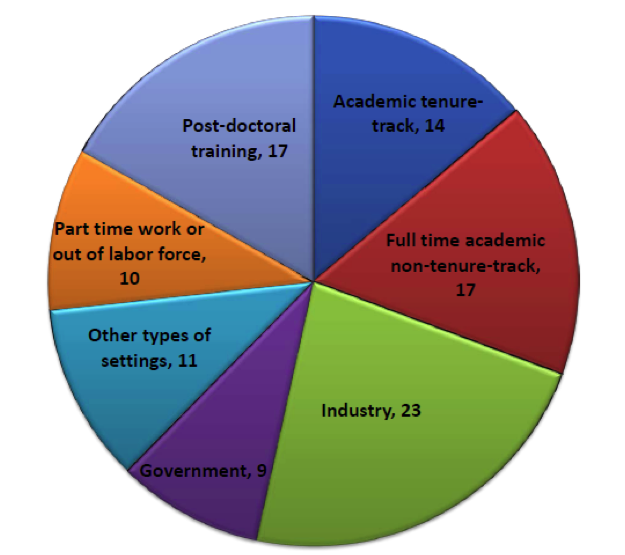Non-Academic Careers are NOT Alternative
by
 Today’s doctoral programs continue to prepare students for a traditional academic career path despite the inadequate supply of research-focused faculty positions. At the same time, PhDs who decide to pursue a non-academic careers are somehow considered failures or sell-outs by the Ivory Tower. However, a gaping hole remains in this type of reasoning. The academic training has ignored the many trainees who will pursue non-traditional positions. The facts are undeniable, and as Meghan Mott masterfully demonstrates with a series of eye-opening and alarming facts in her article Careers in Traditional Academia: Outlook Bleak, academia simply has no room for the newly minted PhDs. As a result, the majority of PhDs will have to pursue non-academic careers.
Today’s doctoral programs continue to prepare students for a traditional academic career path despite the inadequate supply of research-focused faculty positions. At the same time, PhDs who decide to pursue a non-academic careers are somehow considered failures or sell-outs by the Ivory Tower. However, a gaping hole remains in this type of reasoning. The academic training has ignored the many trainees who will pursue non-traditional positions. The facts are undeniable, and as Meghan Mott masterfully demonstrates with a series of eye-opening and alarming facts in her article Careers in Traditional Academia: Outlook Bleak, academia simply has no room for the newly minted PhDs. As a result, the majority of PhDs will have to pursue non-academic careers.
I can go even further to suggest that the term “alternative” can be applied to a career in academia, because since 2001:
< 20% of biology PhDs have been moving into tenure-track 5-6 years after receiving the degree (in 2006, only 14% these PhDs were in tenure positions)
43% are employed in non-academic positions:
- 23% in industry
- 9% in government
- And 11% in other types of settings
17% are employed full-time in non-tenure-track academic positions.
10% work part-time or are out of the labor force.
17% are still in postdoctoral training.

Figure: PhD career paths 5-6 years after receiving PhD (These data are from the 2006 National Science Foundation Survey of Doctorate Recipients, as analyzed by Paula Stephan (Stephan, 2012))
.
It is no longer possible to deny the fact that the majority of PhD recipients will have to look outside of Academia for employment, yet their traditional training does not necessarily reflect the job skills currently in demand on the job market. As a result, many new PhDs are forced to default into doing a series of post-doc fellowships, which may not necessarily increase their chances of getting a job they want (fewer than 1 in 5 post-docs will actually get a tenured faculty position!). It is becoming painfully clear that graduate training programs should be raising awareness about non-academic opportunities and what they entail. While it should be the incentive of graduate programs to educate students about possible career choices before they are thrown into the job market, in most cases, PhD students have to provide for themselves and look for such opportunities on their own. So, given that academic jobs are limited and the current graduate training does not prepare the majority of students for jobs outside of the traditional academic career, I think it would be prudent for every PhD student to think about their professional development while they are still in the midst of their graduate training.
.
Yevgeniy grew up in New York, but decided to transplant himself to the West Coast for his PhD studies at the Scripps Research Institute, where he studied mechanisms of gene regulation in the immune system. Recently, Yevgeniy again found himself in New York City, pursuing a post-doctoral research project in oncology. In his spare time Yevgeniy works as a Krav Maga self-defense instructor, and as a scientific writer to share his passion for fostering communication between the scientific community and the public.
.
For more PhD Tales from the Couch, see Yevgeniy Grigoryev’s previous articles:
Sharing PhD Tales from the Couch
.


fabricio
wrote on June 27, 2012 at 2:31 pm
worst. term. ever. i got into science with the goal of going into something other than the classic "academic" or "industry" career, so it's really annoying when people talk to my about my "alternative" career path when it's been my main goal all along. nothing alternative about it!!!
Henry
wrote on June 27, 2012 at 10:36 pm
see also our recent article in PLoS ONE on science PhD career preferences: http://www.plosone.org/article/info%3Adoi%2F10.13…
biogeek
wrote on June 28, 2012 at 2:16 pm
Why are "out of labor force" and "part time work" lumped together? This presents part time work as the equivalent of not working at all which is rather offensive.
Yevgeniy
wrote on June 28, 2012 at 2:56 pm
Thank you for bringing up this point. I agree, being employed part-time is definitely not equivalent to out of labor force (unemployed). This diagram is taken from the 2006 NSF survey and I think this particular categorization still represents the general mentality of traditional academic employment vs. non-academic, with academic employment being ranked higher on the prestige ladder. I wonder if freelance type of work was also lumped under part-time. While this type of classification has its limitations, I think it does prove the point that PhD recipients represent a very diverse pool of career directions, with academia being only one direction among many other ones.
@OmicsScience
wrote on June 29, 2012 at 5:59 am
THANK YOU for this post. I've been saying this since I realized the number of options that are there for PhD graduates. Let's remove any label that adds stress to the already stressed PhD graduates. Let's not put any label at all. There are many ways to serve science and we all need each other.
equationforlife
wrote on July 11, 2012 at 1:11 am
I couldn't agree more with this…the earlier you prepare, the better. I'm just starting on my PhD and I'm definitely keeping my options open. All I know for sure is I want to do something science related.